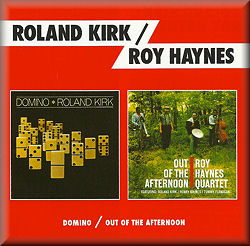1. Domino
2. Meeting on Termini's Corner
3. Time
4. Lament
5. A Stritch In Time
6. 3-in-1 Without the Oil
7. Get Out of Town
8. Rolando
9. I Believe in You
10. E.D.
11. Domino
12. Moon Ray
13.
Fly Me to the Moon
14. Raoul
15. Snap Crackle
16. If I Should Lose You
17. Long Wharf
18. Some Other Spring
Roland Kirk - Tenor sax, stritch, manzello, C-flute, nose flute, siren whistle
Roy Haynes - Drums (tracks 7-18)
Andrew Hill - Piano, celeste (tracks 1-6)
Vernon Martin - Bass (tracks 1-11)
Henry Duncan - Drums (tracks 1-6)
Wynton Kelly - Piano (tracks 7-10)
Herbie Hancock - Piano (track 11)
Tommy Flanagan - Piano (tracks 12-18)
Henry Grimes - Bass (tracks 12-18)
This CD includes the contents of two LPs from 1962: Domino and Out of the Afternoon. The front cover is misleading, as Roy Haynes does not appear on the first six tracks, where the drummer is Henry Duncan. But there is a bonus of an alternative version of the tune Domino which has Haynes on drums, as well as Herbie Hancock at the piano.
Roland Kirk and Roy Haynes make a good pairing, as they are both extrovert players who are not averse to making plenty of noise. Note, for example, the end of the second version of Domino (track 11) where Roland makes shrieking noises through his flute, which encourages Roy to increase the volume. In fact Haynes' drums seem too intrusive in such tracks as Moon Ray, especially as Tommy Flanagan's solos tend to be restrained, providing the perfect foil to Kirk's exuberance. Haynes kicks off most numbers on this LP with potent drumming, and his solos are always well-constructed.
The Domino album includes several passages which are almost avant-garde, particularly with the presence of pianist Andrew Hill, noted for his adventurous playing. Kirk's sense of humour is illustrated by his inserting quotes from Nick, Nack, Paddy Whack into Lament. Several tracks use his unique way of playing more than one instrument at once. And at the end of 3-in-1 Without the Oil he holds a note for 20 seconds! Roland composed several of the tunes on this LP, and they all show his broad imagination. His Meeting on Termini's Corner (a tribute to New York's Five Spot club) starts with dislocated rhythms in the style of free improv, and it ends with piano and tenor sax treading carefully together one note at a time, as if they are crossing stepping stones. A Stritch in Time is an attractively buoyant waltz.
When the jazz magazine Down Beat reviewed these two LPs, it gave them four-and-a-half stars out of five, suggesting a slight feeling that these were not Kirk's or Haynes's very best albums. I would agree with that assessment, but these discs are certainly very good and show that both men were virtuosic musicians. And although some critics accused Roland Kirk of gimmickry for using several instruments simultaneously, his performances here indicate that he was not using gimmicks but searching for more and more varied sounds.
Tony Augarde
www.augardebooks.co.uk
